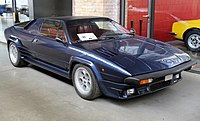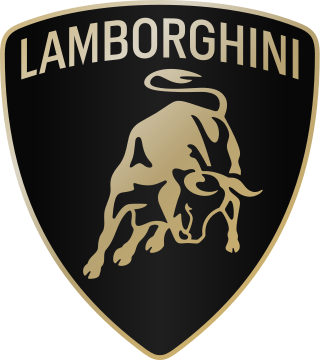
Automobili Lamborghini S.p.A. is an Italian manufacturer of luxury sports cars and SUVs based in Sant'Agata Bolognese. The company is owned by the Volkswagen Group through its subsidiary Audi.

The Lamborghini Murciélago is a sports car produced by Italian automotive manufacturer Lamborghini between 2001 and 2010. The successor to the Diablo and flagship V12 of the automaker's lineup, the Murciélago was introduced as a coupé in 2001. The car was first available in North America for the 2002 model year. The Murciélago was Lamborghini's first new design in eleven years, and was also the brand's first new model under the ownership of German parent company Audi, which is owned by Volkswagen. The car is designed by Peruvian-born Belgian Luc Donckerwolke, Lamborghini's head of design from 1998 to 2005.

The Lamborghini Diablo is a high-performance mid-engine sports car built by Italian automobile manufacturer Lamborghini between 1990 and 2001. It is the first production Lamborghini capable of attaining a top speed in excess of 200 mph (320 km/h). After the end of its production run in 2001, the Diablo was replaced by the Lamborghini Murciélago. The name Diablo means "devil" in Spanish.

The Ferrari Testarossa is a 12-cylinder mid-engine sports car manufactured by Ferrari, which went into production in 1984 as the successor to the Ferrari Berlinetta Boxer. The Pininfarina-designed car was originally produced from 1984 until 1991, with two model revisions following the end of Testarossa production called the 512 TR and F512 M, which were produced from 1992 until 1996. Including revised variations, almost 10,000 cars in total were produced, making it at the time one of the most mass-produced Ferrari models.
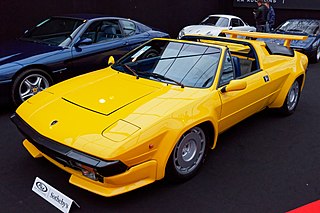
The Lamborghini Jalpa is a sports car produced by the Italian automotive manufacturer Lamborghini from 1981 until 1988. It debuted at the 1981 Geneva Motor Show alongside the Lamborghini LM001 concept off-road vehicle. The Jalpa was the last Lamborghini to use a V8 engine until the Urus SUV in 2018.

The Lamborghini Gallardo is a sports car built by the Italian automotive manufacturer Lamborghini from 2003 to 2013. It is Lamborghini's second car released under parent company Audi, and the best-selling model at the time with 14,022 built throughout its production run. Named after a famous breed of fighting bull, the V10 powered Gallardo has been Lamborghini's sales leader and stable-mate to a succession of V12 flagship models—first to the Murciélago, then to the Aventador, being the first entry-level Lamborghini in one-and-half decades. On 25 November 2013, the last Gallardo was rolled off the production line. The Gallardo was replaced by the Huracán in 2014.
Pagani Automobili S.p.A. is an Italian manufacturer of sports cars and carbon fiber components. The company was founded in 1992 by Argentine businessman and engineer Horacio Pagani and is based in San Cesario sul Panaro, near Modena, Italy.

The Bugatti EB 110 is a mid-engine sports car initially conceived by Ing. Paolo Stanzani in the mid 1980s and produced by Bugatti Automobili S.p.A. from 1991 until 1995, when the company was liquidated. The model restarted the brand's presence in the automobile industry after a hiatus of nearly 40 years.
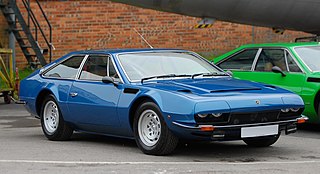
The Lamborghini Jarama is a 2+2 grand tourer manufactured and marketed by Italian car manufacturer Lamborghini between 1970 and 1976. It was styled by Bertone designer Marcello Gandini.

The Lamborghini Urraco is a 2+2 sports car manufactured by Italian automaker Lamborghini, introduced at the Turin Auto Show in 1970 and marketed for 1972–1979 model years. It was named after a line of Miura-bred fighting bulls.

The Lamborghini Calà was a concept car designed for Lamborghini by Italdesign Giugiaro. It was first shown at the 1995 Geneva Motor Show. It was a completely functional prototype that never made it into production. Its name was derived from the Piedmontese dialect of Northern Italy and meant “look, over there!”
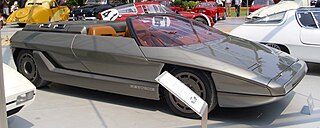
The Lamborghini Athon is a concept car designed by Bertone for Lamborghini.

The Lamborghini Reventón is a mid-engine limited production sports car that debuted at the 2007 Frankfurt Motor Show. The official press release stated that only 20 vehicles would be sold to the public, with one additional car produced for the Lamborghini museum. Each car is stamped with its number in the sequence of 20 between the driver and passenger seats.

The Lamborghini Sesto Elemento is a high-performance limited edition car produced by the Italian automobile manufacturer Lamborghini, which debuted at the 2010 Paris Motor Show. The Sesto Elemento's name is a reference to the atomic number of carbon, referring to the carbon fibre used in its construction.

The Lamborghini Aventador is a mid-engine sports car that was produced by the Italian automotive manufacturer Lamborghini from 2011 until 2022. The Aventador’s namesake is a Spanish fighting bull that fought in Zaragoza, Aragón, in 1993. The Aventador was the successor to the Murciélago and was produced in Sant'Agata Bolognese, Italy.

The Lamborghini Urus is a high performance luxury SUV manufactured by Italian automobile manufacturer Lamborghini. It was introduced in December 2017 as a 2018 model year production vehicle. The Urus is the first Lamborghini SUV and five-door vehicle in the modern era, and the second SUV in the brand's history after the LM002, which was produced between 1986 and 1993.
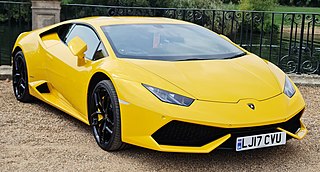
The Lamborghini Huracán is a sports car manufactured by Italian automotive manufacturer Lamborghini replacing the previous V10 offering, the Gallardo. The Huracán was revealed online in December 2013, making its worldwide debut at the 2014 Geneva Auto Show and was released in the market in the second quarter of 2014.

Automobili Lamborghini S.p.A. is an Italian brand and manufacturer of luxury automobiles. Lamborghini's production facility and headquarters are located in Sant'Agata Bolognese, Italy. Italian manufacturing magnate Ferruccio Lamborghini founded the company in 1963 with the objective of producing a refined grand touring car to compete with offerings from established marques such as Ferrari. The company's first models were introduced in the mid-1960s and were noted for their refinement, power and comfort. Lamborghini gained wide acclaim in 1966 for the Miura sports coupé, which established rear mid-engine, rear wheel drive as the standard layout for high-performance cars of the era.

The Lamborghini P140 is a code name given to a series of prototype cars built by Lamborghini starting in 1987. It was intended as a replacement for the outgoing Jalpa but never went into production, despite being close to production ready due to the fading interest of customers into high performance cars due to the Gulf Oil Crisis of the 1990s. The P140 was the first Lamborghini to be powered by a V10 engine.

The Lamborghini Centenario is a limited production sports car based on the Lamborghini Aventador which was unveiled at the 2016 Geneva Motor Show to commemorate the 100th birthday of the company's founder, Ferruccio Lamborghini.

